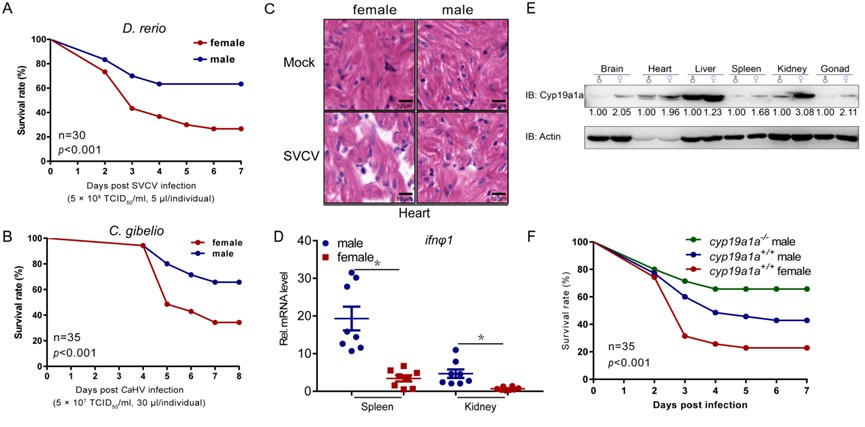Highlights
Fish Female-biased Gene cyp19a1a Leads to Female Antiviral Response Attenuation between Sexes
Eukaryotes display gender differences in their morphology, physiology, or behavior, and the immune system is no exception. For instance, males are more likely than females to experience cytokine storms after infection with severe acute respiratory syndrome coronavirus 2 (SARS-CoV-2). Compared with males, females are more likely to suffer from autoimmune diseases.
Studies have shown that sex hormones and sex chromosome coding genes are the two primary reasons for sex differences in immune response, but other causes are still unknown.
Recently, researchers from the Institute of Hydrobiology (IHB) of the Chinese Academy of Sciences have found that zebrafish cyp19a1a (cytochrome P450, family 19, subfamily A, polypeptide 1a), an autosomal gene with female-biased expression, causes female fish to exhibit a lower antiviral response. This study was published online in PLoS Pathogens.
In this study, the researchers first screened several sex-biased genes and found that the gonadal aromatase gene cyp19a1a highly expressed in the female fish and cyp19a1a-/- zebrafish exhibited stronger antiviral response, accompanied with higher IFN production.
Further investigation of the molecular mechanism revealed that Cyp19a1a targets MITA for autophagic degradation. Interestingly, the autophagy factor ATG14 (autophagy-related 14) was found interacted with Cyp19a1a to either promote or attenuate Cyp19a1a-mediated MITA degradation by either being overexpressed or knocked down, respectively.
Finally, at the cellular level, both the normal and MITA-enhanced cellular antiviral responses were diminished by Cyp19a1a.
This study demonstrated a sex difference in the antiviral response based on a regulation mechanism controlled by a female-biased gene besides sex chromosome and hormonal differences, supplying the current understanding of sex differences in fish.

Females are more susceptible to virus infection than males (Image by IHB)
(Editor: MA Yun)